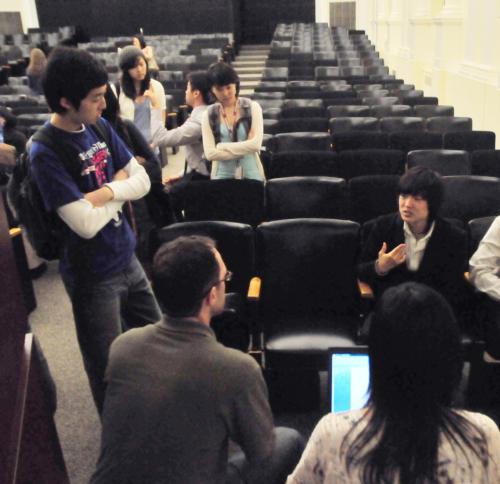
News
Harvard Quietly Resolves Anti-Palestinian Discrimination Complaint With Ed. Department

News
Following Dining Hall Crowds, Harvard College Won’t Say Whether It Tracked Wintersession Move-Ins

News
Harvard Outsources Program to Identify Descendants of Those Enslaved by University Affiliates, Lays Off Internal Staff

News
Harvard Medical School Cancels Class Session With Gazan Patients, Calling It One-Sided

News
Garber Privately Tells Faculty That Harvard Must Rethink Messaging After GOP Victory
N. Korean Tells His Escape Story
Choi speaks as part of Awareness Week for Human Rights in N. Korea

Standing on a riverbank at the border of North Korea and China in 2002, Hyo-Sung Choi spoke by telephone to his mother three years after he thought she had died.
“I cried for half an hour,” said Choi, who relayed his experiences fleeing from North Korea to members of the Harvard community in Emerson Hall yesterday, at an event that was part of the Harvard Undergraduates for Human Rights in North Korea’s (HRiNK) Awareness Week.
Unfortunately, Choi’s moment of joy passed quickly. Choi had been held against his will by a man who had convinced him to travel with him to see Choi’s mother. Instead, Choi was held for a ransom of $50,000.
It was only after the customers at his exiled mother’s restaurant in South Korea raised $30,000 that the man released Choi, allowing him to travel to South Korea to be with his mother.
Choi, who is now a high school student in Los Angeles, shared stories from the 14 years he lived in North Korea, as translated from Korean to English by Hee Kwon Seo ’11, who is also a Crimson news writer.
In addition to recounting how his mother, a spy for the North Korean government, was sentenced to death for expressing her disagreement with the government’s smearing of an innocent man, Choi described the standard of living in his home country.
He spoke about the extreme lack of food in North Korea, describing how people would eat tree bark, plant roots, and weeds to stay alive.
“He knows very well about the situation in North and South Korea,” said Hyung Kun Lee, a Korean consul in Boston, who attended Choi’s speech. “His story is very tragic, and I have much sympathy for him.”
This is HRiNK’s first year putting on an awareness week, an event they have been planning since the group received official recognition from Harvard last September, according to Jieun Baek ’09, a co-director of HRiNK.
“What we want to do is take attention away from the political aspect and raise awareness of the strife individuals are going through,” Baek said.
On Tuesday and Wednesday, the group passed out North Korean fact sheets and Rice Krispies treats outside of the Science Center. Attached to each treat was a note telling the recipient that the average North Korean has a daily ration of 300 grams of food, the equivalent of a Rice Krispies treat for each meal.
Tomorrow, the group will screen a documentary about North Koreans illegally escaping into China, and on Saturday, it will hold a show featuring undergraduate performances inspired by rights violations around the world.
“I think the kind of reception students have had to the Awareness Week just shows the importance of this issue and the urgency of getting people involved in the situation,” said HRiNK co-director Edward Y. Lee ’08.
—Staff writer Lauren D. Kiel can be reached at lkiel@fas.harvard.edu.
Want to keep up with breaking news? Subscribe to our email newsletter.
